北师大版(2019)选修二Unit 4 Humour Lesson 1 What’s So Funny?语法课件(共28张PPT)
文档属性
| 名称 | 北师大版(2019)选修二Unit 4 Humour Lesson 1 What’s So Funny?语法课件(共28张PPT) | 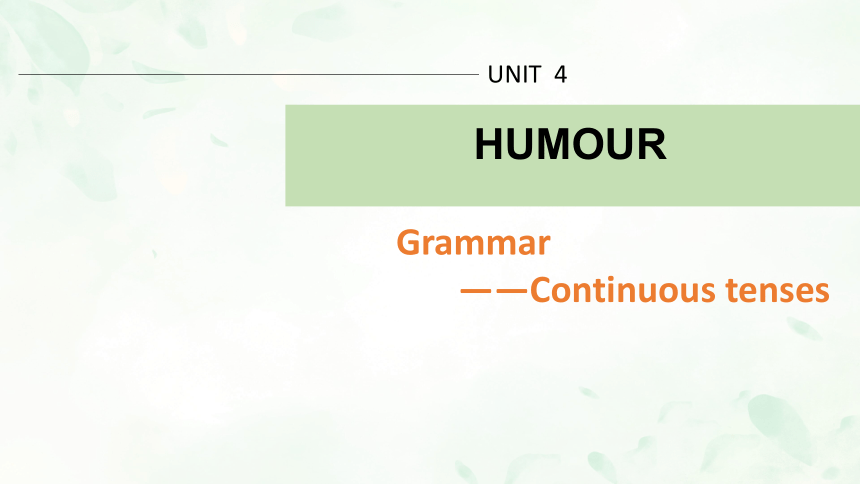 | |
| 格式 | zip | ||
| 文件大小 | 35.1MB | ||
| 资源类型 | 教案 | ||
| 版本资源 | 北师大版(2019) | ||
| 科目 | 英语 | ||
| 更新时间 | 2022-12-26 16:25:08 | ||
图片预览

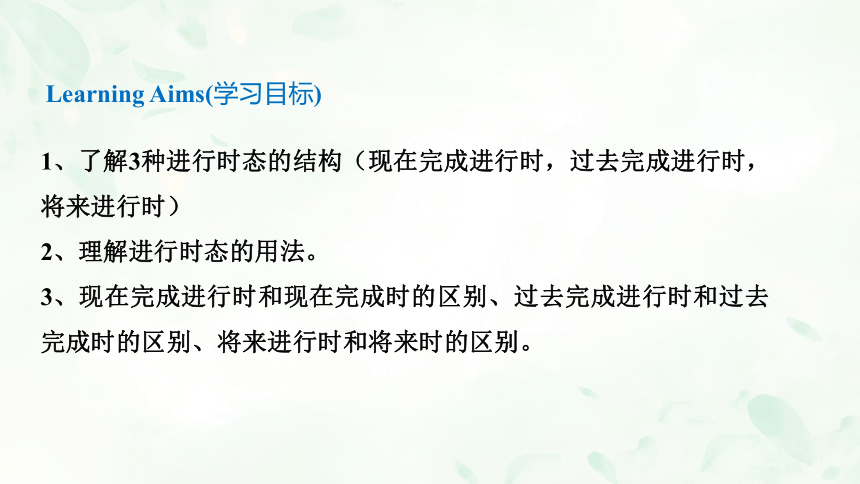
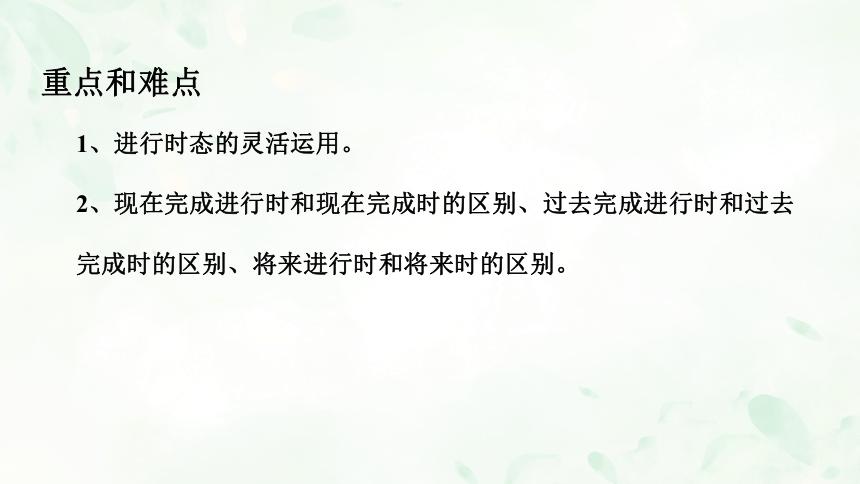

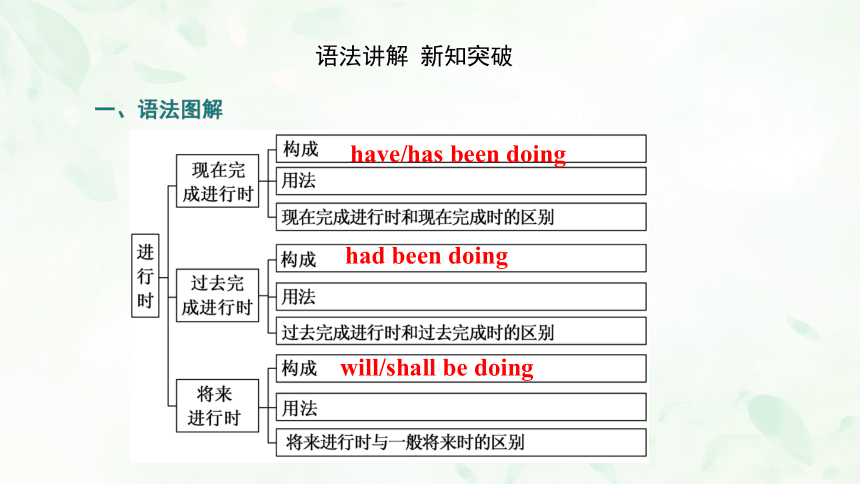
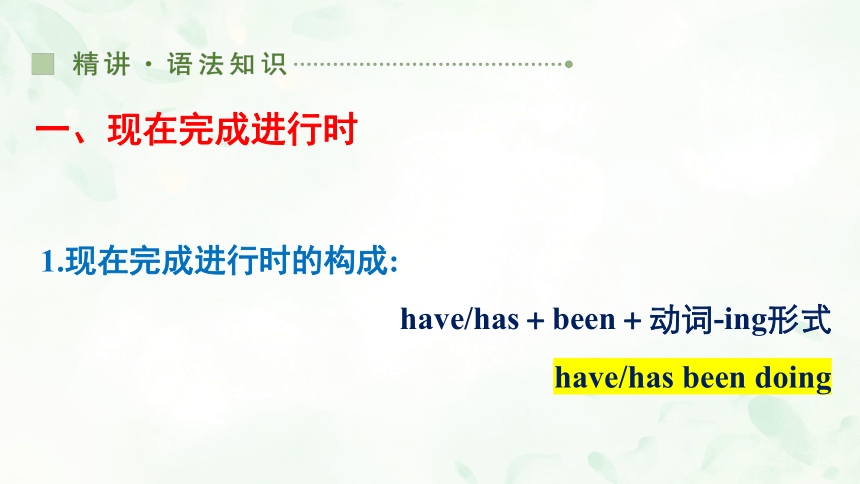
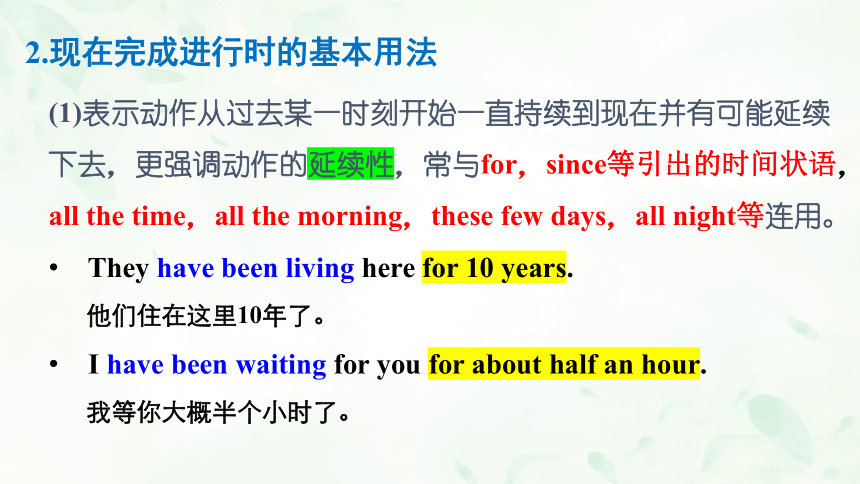
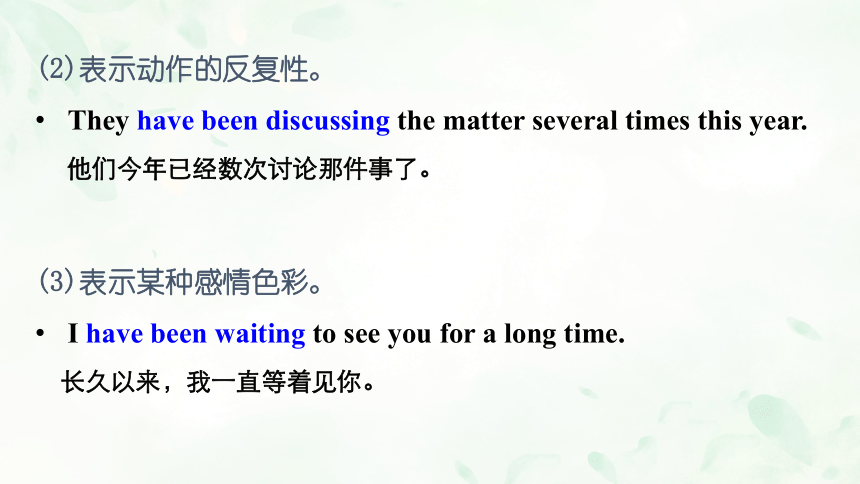
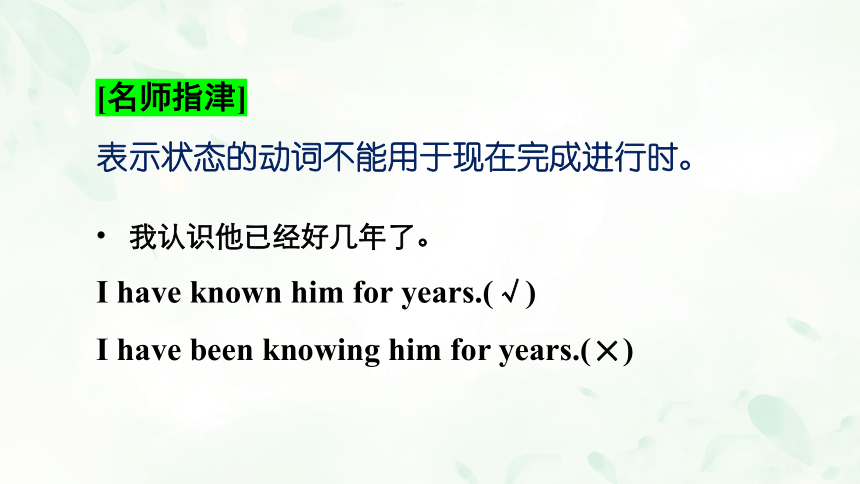
文档简介
(共28张PPT)
HUMOUR
UNIT 4
Grammar
——Continuous tenses
Learning Aims(学习目标)
1、了解3种进行时态的结构(现在完成进行时,过去完成进行时,将来进行时)
2、理解进行时态的用法。
3、现在完成进行时和现在完成时的区别、过去完成进行时和过去完成时的区别、将来进行时和将来时的区别。
重点和难点
1、进行时态的灵活运用。
2、现在完成进行时和现在完成时的区别、过去完成进行时和过去
完成时的区别、将来进行时和将来时的区别。
语法导学 感悟规律
语法讲解 新知突破
have/has been doing
had been doing
will/shall be doing
一、现在完成进行时
1.现在完成进行时的构成:
have/has+been+动词-ing形式
have/has been doing
2.现在完成进行时的基本用法
(1)表示动作从过去某一时刻开始一直持续到现在并有可能延续下去,更强调动作的延续性,常与for,since等引出的时间状语,all the time,all the morning,these few days,all night等连用。
They have been living here for 10 years.
他们住在这里10年了。
I have been waiting for you for about half an hour.
我等你大概半个小时了。
(2)表示动作的反复性。
They have been discussing the matter several times this year.
他们今年已经数次讨论那件事了。
(3)表示某种感彩。
I have been waiting to see you for a long time.
长久以来,我一直等着见你。
[名师指津]
表示状态的动词不能用于现在完成进行时。
我认识他已经好几年了。
I have known him for years.(√)
I have been knowing him for years.(×)
①—Where is Peter I can’t find him anywhere.
—He went to the library after breakfast and ____________________ (write) his essay there ever since.
②The girl has a great interest in sports and ____________________ (take) badminton classes twice a week over the last three years.
③In order to find the missing child,villagers ____________________ (do) all they can over the past five hours.
单句语法填空(现在完成进行时)
has been writing
has been taking
have been doing
④Tom ____________________ (work) hard since the new term began.
⑤I ____________________ (play) football all the morning,so I’m sweating heavily.
has been working
have been playing
3.现在完成进行时和现在完成时的区别
时态 基本语法功能 动作的反复 感彩
现在完成进行时 表示动作的持续 可表示动作的反复 可表示强烈的感彩
现在完成时 表示动作对现在的影响或产生的结果 不表示动作的反复 一般不含有感彩
He has written a letter.
他写了一封信。(信已写好)
He has been writing a letter.
他一直在写一封信。(信尚未完成)
Have you met him recently
你最近见过他吗?(现实结果)
Have you been meeting him recently
你最近常和他见面吗?(动作的反复)
例句对比
My father has lost his keys.
我父亲把钥匙丢了。(陈述事实)
My father has always been losing his keys.
我父亲总是丢钥匙。(“有责怪或无奈”之意)
①That famous painting __________________ (miss) for two weeks now. The police ___________________ (look) for it.
②I __________________ (write) the book,but I still ______________
(not finish) it.
③They ________ never _________ (learn) to swim.
④We ____________________ (look) forward to our summer vacation.
单句语法填空/完成句子(用现在完成时或现在完成进行时)
has been missing
have been looking
have been writing
haven’t finished
have
learnt
have been looking
二、过去完成进行时
1.过去完成进行时的构成:
had +been+动词-ing形式
had been doing
(1)表示动作在过去某一时间之前开始,一直延续到这一过去时间。和过去完成时一样,过去完成进行时也必须以过去的时间为前提。常与by引出的时间状语、before或when引导的从句(从句用一般过去时)、表示一段时间的状语(如for hours,all these days)等连用。
They had only been waiting for the bus a few moments when it came.
他们只等了一会儿公交车就来了。
(2)表示反复的动作。
He had been mentioning your name to me before you came here.在你来之前他多次向我提起你的名字。
2.过去完成进行时的基本用法
①She was very tired.She __________________ all day.
她很累了。她整天都在工作。
②When I first met Jane,she ___________________ in that school for 10 years.
我第一次遇到简的时候,她已在那所学校工作了10年了。
③How long ___________________ before you shut the window
你关窗户之前雨下了多久了?
完成句子(过去完成进行时)
had been working
had been working
had it been raining
3.过去完成进行时和过去完成时的区别
过去完成时:
通常表示在过去某一时间或动作之前已完成的动作或状态。
过去完成进行时:
表示从过去某一时间开始持续到过去另一时间的动作或状态。
She had cleaned the office, so it was very tidy.
她已经打扫过办公室了,所以很整洁。(强调结果)
She had been cleaning the office, so we had to wait outside.
她一直在打扫办公室,所以我们不得不在外面等着。(强调动作一直在进行)
完成句子(用过去完成时或过去完成进行时)
①The teacher told us that he since he came here.
老师告诉我们,自从他来到这里就一直教英语。
②He in the US for many years, but when he came back, he became a businessman.
他在美国做了多年的研究,但他回来时,他成了一名商人。
③He before I came back.
在我回来之前,他已经完成了这份报告。
三、将来进行时
1.将来进行时的构成:
will/shall + be+动词-ing形式
will/shall be doing
2.将来进行时的基本用法
(1)表示将来某一时间段内或某一时刻正在进行的动作。常与表示将来的时间状语连用。
What will you be doing at eight tomorrow
明天八点你会在做什么?
(2)表示已经决定或安排好要发生的动作。
I shall be having an exam at this time tomorrow.
我明天这个时候正在考试。
(3)表示预测可能会发生的事。
The weather report says that it will be raining when we hold the sports meeting.
天气预报说我们举行运动会时将有雨。
(4)表示亲切或委婉的语气。
Will you be visiting the national park to see the wildlife up close
你将要去参观国家公园来近距离地观看野生动物吗?
3.将来进行时与一般将来时的区别
(1) 一般将来时:
表示将来某一时间将要发生的动作,不表示动作正在进行;
将来进行时:
通常表示将来某个时刻或某一段时间正在进行的动作。
When he comes,I will give him some advice.
当他来时,我会给他一些建议。
When I get home,he will probably be watching TV.
当我到家时,他也许正在看电视。
(2)两者均可表示将来,但用将来进行时语气更委婉。
When will you pay back the money
你什么时候还钱?(似乎在直接讨债)
When will you be paying back the money
这钱你什么时候还呢?(语气委婉)
(3)有时一般将来时中的will含有“愿意”的意思,而will用于将来进行时时则只是单纯地谈未来的情况。
Mary won’t pay this bill.
玛丽不肯付这笔钱。(表意愿)
单句语法填空
①When he comes to my house tomorrow,I ______________ (write)the report.
②Don’t phone me between 8:00 and 10:00. We _______________ (have)
classes then.
③I think that she ________________ (work) on this experiment until tomorrow morning.
④Premier Li ________________ (make)a speech on TV at 8 pm on Friday evening.
⑤As you go through this book,you ____________ (find) that each of the millions of people who lived through World War Ⅱ had a different experience.
will be writing
will be having
will be working
will be making
will find
Thanks!
HUMOUR
UNIT 4
Grammar
——Continuous tenses
Learning Aims(学习目标)
1、了解3种进行时态的结构(现在完成进行时,过去完成进行时,将来进行时)
2、理解进行时态的用法。
3、现在完成进行时和现在完成时的区别、过去完成进行时和过去完成时的区别、将来进行时和将来时的区别。
重点和难点
1、进行时态的灵活运用。
2、现在完成进行时和现在完成时的区别、过去完成进行时和过去
完成时的区别、将来进行时和将来时的区别。
语法导学 感悟规律
语法讲解 新知突破
have/has been doing
had been doing
will/shall be doing
一、现在完成进行时
1.现在完成进行时的构成:
have/has+been+动词-ing形式
have/has been doing
2.现在完成进行时的基本用法
(1)表示动作从过去某一时刻开始一直持续到现在并有可能延续下去,更强调动作的延续性,常与for,since等引出的时间状语,all the time,all the morning,these few days,all night等连用。
They have been living here for 10 years.
他们住在这里10年了。
I have been waiting for you for about half an hour.
我等你大概半个小时了。
(2)表示动作的反复性。
They have been discussing the matter several times this year.
他们今年已经数次讨论那件事了。
(3)表示某种感彩。
I have been waiting to see you for a long time.
长久以来,我一直等着见你。
[名师指津]
表示状态的动词不能用于现在完成进行时。
我认识他已经好几年了。
I have known him for years.(√)
I have been knowing him for years.(×)
①—Where is Peter I can’t find him anywhere.
—He went to the library after breakfast and ____________________ (write) his essay there ever since.
②The girl has a great interest in sports and ____________________ (take) badminton classes twice a week over the last three years.
③In order to find the missing child,villagers ____________________ (do) all they can over the past five hours.
单句语法填空(现在完成进行时)
has been writing
has been taking
have been doing
④Tom ____________________ (work) hard since the new term began.
⑤I ____________________ (play) football all the morning,so I’m sweating heavily.
has been working
have been playing
3.现在完成进行时和现在完成时的区别
时态 基本语法功能 动作的反复 感彩
现在完成进行时 表示动作的持续 可表示动作的反复 可表示强烈的感彩
现在完成时 表示动作对现在的影响或产生的结果 不表示动作的反复 一般不含有感彩
He has written a letter.
他写了一封信。(信已写好)
He has been writing a letter.
他一直在写一封信。(信尚未完成)
Have you met him recently
你最近见过他吗?(现实结果)
Have you been meeting him recently
你最近常和他见面吗?(动作的反复)
例句对比
My father has lost his keys.
我父亲把钥匙丢了。(陈述事实)
My father has always been losing his keys.
我父亲总是丢钥匙。(“有责怪或无奈”之意)
①That famous painting __________________ (miss) for two weeks now. The police ___________________ (look) for it.
②I __________________ (write) the book,but I still ______________
(not finish) it.
③They ________ never _________ (learn) to swim.
④We ____________________ (look) forward to our summer vacation.
单句语法填空/完成句子(用现在完成时或现在完成进行时)
has been missing
have been looking
have been writing
haven’t finished
have
learnt
have been looking
二、过去完成进行时
1.过去完成进行时的构成:
had +been+动词-ing形式
had been doing
(1)表示动作在过去某一时间之前开始,一直延续到这一过去时间。和过去完成时一样,过去完成进行时也必须以过去的时间为前提。常与by引出的时间状语、before或when引导的从句(从句用一般过去时)、表示一段时间的状语(如for hours,all these days)等连用。
They had only been waiting for the bus a few moments when it came.
他们只等了一会儿公交车就来了。
(2)表示反复的动作。
He had been mentioning your name to me before you came here.在你来之前他多次向我提起你的名字。
2.过去完成进行时的基本用法
①She was very tired.She __________________ all day.
她很累了。她整天都在工作。
②When I first met Jane,she ___________________ in that school for 10 years.
我第一次遇到简的时候,她已在那所学校工作了10年了。
③How long ___________________ before you shut the window
你关窗户之前雨下了多久了?
完成句子(过去完成进行时)
had been working
had been working
had it been raining
3.过去完成进行时和过去完成时的区别
过去完成时:
通常表示在过去某一时间或动作之前已完成的动作或状态。
过去完成进行时:
表示从过去某一时间开始持续到过去另一时间的动作或状态。
She had cleaned the office, so it was very tidy.
她已经打扫过办公室了,所以很整洁。(强调结果)
She had been cleaning the office, so we had to wait outside.
她一直在打扫办公室,所以我们不得不在外面等着。(强调动作一直在进行)
完成句子(用过去完成时或过去完成进行时)
①The teacher told us that he since he came here.
老师告诉我们,自从他来到这里就一直教英语。
②He in the US for many years, but when he came back, he became a businessman.
他在美国做了多年的研究,但他回来时,他成了一名商人。
③He before I came back.
在我回来之前,他已经完成了这份报告。
三、将来进行时
1.将来进行时的构成:
will/shall + be+动词-ing形式
will/shall be doing
2.将来进行时的基本用法
(1)表示将来某一时间段内或某一时刻正在进行的动作。常与表示将来的时间状语连用。
What will you be doing at eight tomorrow
明天八点你会在做什么?
(2)表示已经决定或安排好要发生的动作。
I shall be having an exam at this time tomorrow.
我明天这个时候正在考试。
(3)表示预测可能会发生的事。
The weather report says that it will be raining when we hold the sports meeting.
天气预报说我们举行运动会时将有雨。
(4)表示亲切或委婉的语气。
Will you be visiting the national park to see the wildlife up close
你将要去参观国家公园来近距离地观看野生动物吗?
3.将来进行时与一般将来时的区别
(1) 一般将来时:
表示将来某一时间将要发生的动作,不表示动作正在进行;
将来进行时:
通常表示将来某个时刻或某一段时间正在进行的动作。
When he comes,I will give him some advice.
当他来时,我会给他一些建议。
When I get home,he will probably be watching TV.
当我到家时,他也许正在看电视。
(2)两者均可表示将来,但用将来进行时语气更委婉。
When will you pay back the money
你什么时候还钱?(似乎在直接讨债)
When will you be paying back the money
这钱你什么时候还呢?(语气委婉)
(3)有时一般将来时中的will含有“愿意”的意思,而will用于将来进行时时则只是单纯地谈未来的情况。
Mary won’t pay this bill.
玛丽不肯付这笔钱。(表意愿)
单句语法填空
①When he comes to my house tomorrow,I ______________ (write)the report.
②Don’t phone me between 8:00 and 10:00. We _______________ (have)
classes then.
③I think that she ________________ (work) on this experiment until tomorrow morning.
④Premier Li ________________ (make)a speech on TV at 8 pm on Friday evening.
⑤As you go through this book,you ____________ (find) that each of the millions of people who lived through World War Ⅱ had a different experience.
will be writing
will be having
will be working
will be making
will find
Thanks!
同课章节目录
- Unit 4 Humour
- Lesson 1 What’s So Funny?
- Lesson 2 Why Do We Need Humour?
- Lesson 3 My Favourite Comedian
- Unit 5 Education
- Lesson 1 Enlightening a Mind
- Lesson 2 The Objectives of Education
- Lesson 3 Understanding
- Unit 6 The Media
- Lesson 1 From Page to Screen
- Lesson 2 Questions about Media
- Lesson 3 The Advertising Game
